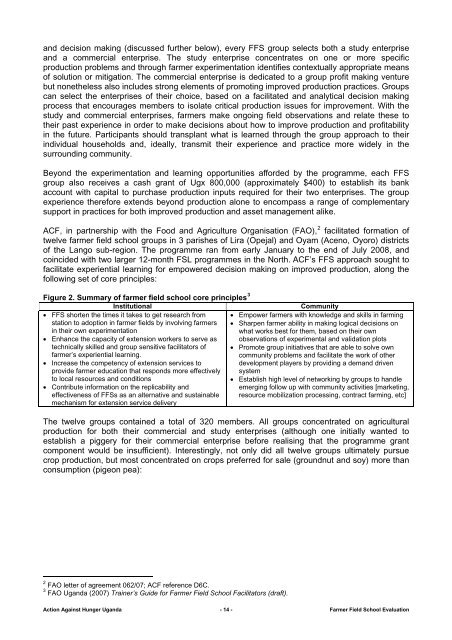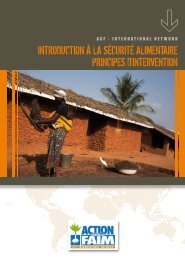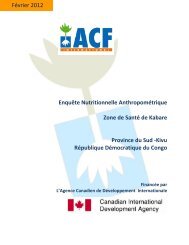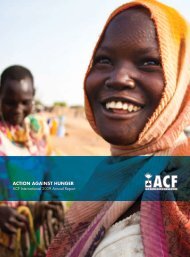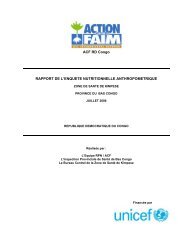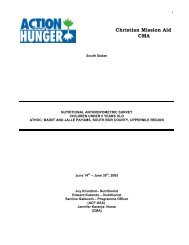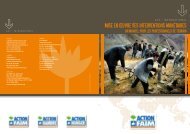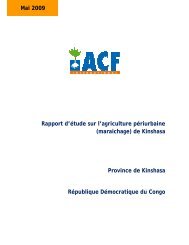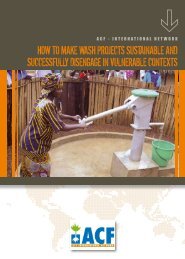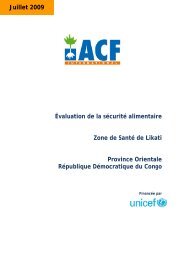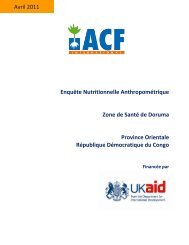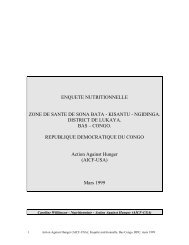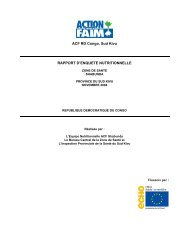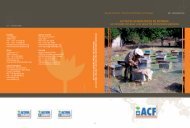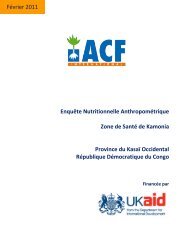Participatory Evaluation of our 2008 - Action Against Hunger
Participatory Evaluation of our 2008 - Action Against Hunger
Participatory Evaluation of our 2008 - Action Against Hunger
Create successful ePaper yourself
Turn your PDF publications into a flip-book with our unique Google optimized e-Paper software.
and decision making (discussed further below), every FFS group selects both a study enterprise<br />
and a commercial enterprise. The study enterprise concentrates on one or more specific<br />
production problems and through farmer experimentation identifies contextually appropriate means<br />
<strong>of</strong> solution or mitigation. The commercial enterprise is dedicated to a group pr<strong>of</strong>it making venture<br />
but nonetheless also includes strong elements <strong>of</strong> promoting improved production practices. Groups<br />
can select the enterprises <strong>of</strong> their choice, based on a facilitated and analytical decision making<br />
process that enc<strong>our</strong>ages members to isolate critical production issues for improvement. With the<br />
study and commercial enterprises, farmers make ongoing field observations and relate these to<br />
their past experience in order to make decisions about how to improve production and pr<strong>of</strong>itability<br />
in the future. Participants should transplant what is learned through the group approach to their<br />
individual households and, ideally, transmit their experience and practice more widely in the<br />
surrounding community.<br />
Beyond the experimentation and learning opportunities afforded by the programme, each FFS<br />
group also receives a cash grant <strong>of</strong> Ugx 800,000 (approximately $400) to establish its bank<br />
account with capital to purchase production inputs required for their two enterprises. The group<br />
experience therefore extends beyond production alone to encompass a range <strong>of</strong> complementary<br />
support in practices for both improved production and asset management alike.<br />
ACF, in partnership with the Food and Agriculture Organisation (FAO), 2 facilitated formation <strong>of</strong><br />
twelve farmer field school groups in 3 parishes <strong>of</strong> Lira (Opejal) and Oyam (Aceno, Oyoro) districts<br />
<strong>of</strong> the Lango sub-region. The programme ran from early January to the end <strong>of</strong> July <strong>2008</strong>, and<br />
coincided with two larger 12-month FSL programmes in the North. ACF’s FFS approach sought to<br />
facilitate experiential learning for empowered decision making on improved production, along the<br />
following set <strong>of</strong> core principles:<br />
Figure 2. Summary <strong>of</strong> farmer field school core principles 3<br />
Institutional<br />
Community<br />
• FFS shorten the times it takes to get research from • Empower farmers with knowledge and skills in farming<br />
station to adoption in farmer fields by involving farmers • Sharpen farmer ability in making logical decisions on<br />
in their own experimentation<br />
what works best for them, based on their own<br />
• Enhance the capacity <strong>of</strong> extension workers to serve as observations <strong>of</strong> experimental and validation plots<br />
technically skilled and group sensitive facilitators <strong>of</strong> • Promote group initiatives that are able to solve own<br />
farmer’s experiential learning.<br />
community problems and facilitate the work <strong>of</strong> other<br />
• Increase the competency <strong>of</strong> extension services to<br />
development players by providing a demand driven<br />
provide farmer education that responds more effectively system<br />
to local res<strong>our</strong>ces and conditions<br />
• Establish high level <strong>of</strong> networking by groups to handle<br />
• Contribute information on the replicability and<br />
emerging follow up with community activities [marketing,<br />
effectiveness <strong>of</strong> FFSs as an alternative and sustainable res<strong>our</strong>ce mobilization processing, contract farming, etc]<br />
mechanism for extension service delivery<br />
The twelve groups contained a total <strong>of</strong> 320 members. All groups concentrated on agricultural<br />
production for both their commercial and study enterprises (although one initially wanted to<br />
establish a piggery for their commercial enterprise before realising that the programme grant<br />
component would be insufficient). Interestingly, not only did all twelve groups ultimately pursue<br />
crop production, but most concentrated on crops preferred for sale (groundnut and soy) more than<br />
consumption (pigeon pea):<br />
2 FAO letter <strong>of</strong> agreement 062/07; ACF reference D6C.<br />
3 FAO Uganda (2007) Trainer’s Guide for Farmer Field School Facilitators (draft).<br />
<strong>Action</strong> <strong>Against</strong> <strong>Hunger</strong> Uganda - 14 - Farmer Field School <strong>Evaluation</strong>


